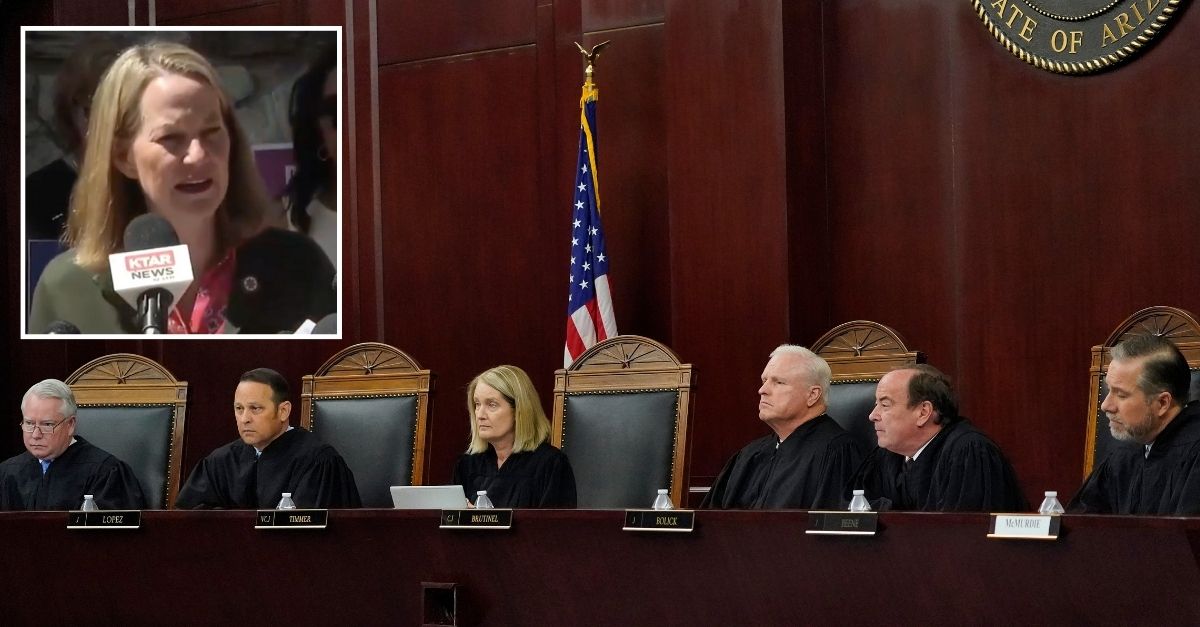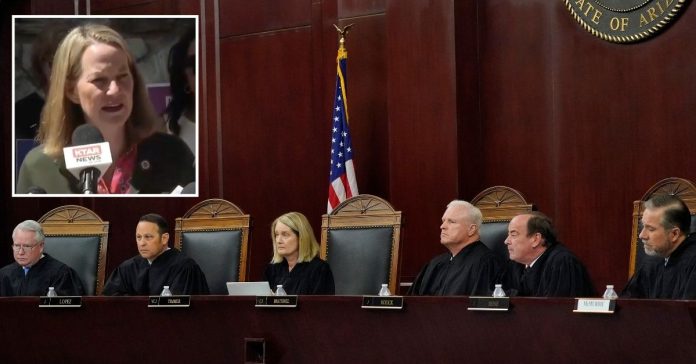
Main: FILE – Arizona Supreme Court Justices from left; William G. Montgomery, John R Lopez IV, Vice Chief Justice Ann A. Scott Timmer, Chief Justice Robert M. Brutinel, Clint Bolick and James Beene listen to oral arguments on April 20, 2021, in Phoenix. The Arizona Supreme Court ruled Tuesday, April 9, 2024, that the state can enforce its long-dormant law criminalizing all abortions except when a mother’s life is at stake. (AP Photo/Matt York, File); Inset: Arizona Attorney General Kris Mayes speaks at a press conference reacting to the court’s ruling (screengrab via Arizona’s Family).
Arizona’s top court ruled Tuesday to uphold a Civil War-era statute that bans nearly all abortions despite the law having been adopted while Arizona was merely a territory. The Arizona Supreme Court temporarily put its ruling on hold for two weeks while a lower court resolves an underlying legal challenge. In the interim, abortion will still be accessible in the state.
The law involved is A.R.S. § 36-2322, which was put on the books in 1864, while Arizona did not become a state until 1912. The statute outlawed abortion from the moment of conception, except when necessary to save the life of the mother. It allowed no exceptions and set out penalties for fines and prison terms of two to five years for doctors prosecuted under it.
Since its inception, the statute has mostly laid dormant. Another statute, A.R.S. § 13-3603, adopted in 1901 and re-codified in 1928 after Arizona’s statehood, governed abortion until after Roe v. Wade was decided. Because A.R.S. § 13-3603 fully banned all abortions, it conflicted with Roe and was declared unconstitutional in 1973. Like the 1864 statute, this second abortion law also remained on the books.
In 2022, following the U.S. Supreme Court’s ruling in Dobbs v. Jackson Women’s Health Organization, Arizona adopted a new abortion law that authorized abortions up to 15 weeks of viability. At the time, then-Gov. Doug Ducey, a Republican, said 2022 law would not override the older law.
Planned Parenthood challenged the Grand Canyon State’s abortion laws and in a 4-2 split decision, the state’s top court said Tuesday that the 2022 law “does not independently authorize abortion,” and that since there is no federal constitutional right to have an abortion, that the 1864 law is “now enforceable.”
Justice John R. Lopez IV wrote for the majority and said, “In light of this Opinion, physicians are now on notice that all abortions, except those necessary to save a woman’s life, are illegal[.]”
After the court’s ruling Tuesday, Ducey posted on X, formerly Twitter, that it was “not the outcome [he] would have preferred,” and urged elected leaders to, “heed the will of the people and address this issue with a policy that is workable and reflective of our electorate.”
Attorney General Kris Mayes issued a statement calling the Arizona Supreme Court’s ruling “unconscionable and an affront to freedom.”
“Make no mistake, by effectively striking down a law passed this century and replacing it with one from 160 years ago, the Court has risked the health and lives of Arizonans,” Mayes said. “The Arizona Court of Appeals decision, which the Supreme Court has struck down today, was well reasoned and aligned with how courts harmonize different legislation.”
Mayes also noted the context underlying the 1864 statute revived by the court:
Today’s decision to reimpose a law from a time when Arizona wasn’t a state, the Civil War was raging, and women couldn’t even vote will go down in history as a stain on our state. This is far from the end of the debate on reproductive freedom, and I look forward to the people of Arizona having their say in the matter. And let me be completely clear, as long as I am Attorney General, no woman or doctor will be prosecuted under this draconian law in this state.
Likewise, Arizona Gov. Katie Hobbs, a Democrat, reacted to the ruling in a post on the social platform X, formerly Twitter.
“It is a dark day in Arizona,” Hobbs said. “We are just fourteen days away from one of the most extreme abortion bans in the country. But my message to Arizona women is this: I won’t rest, and I won’t stop fighting until we have secured the right to abortion.”
Angela Florez, President and CEO of Planned Parenthood Arizona, said in a statement that the court’s “deplorable decision sends Arizona back nearly 150 years.” Florez noted that “Arizonans are overwhelmingly in favor of abortion access,” and chastised the court for failing to “look past personal ideology and impartially apply the law.”
Florez also predicted that the ruling “will be catastrophic for patient care and will have the greatest impact on Black, Indigenous, Latino, and other people of color, young people, LGBTQ+ people, and undocumented people.”
Conservative advocacy group Liberty Counsel Founder Mat Staver, who filed an amicus brief in the case supporting the 1864 law, commended the court’s decision.
In a statement Tuesday, Staver said, “The law was just as correct when it was passed as it is today,” and said that reinstating the 160-year-old statute “will protect countless women and innocent unborn lives.”
Have a tip we should know? [email protected]

